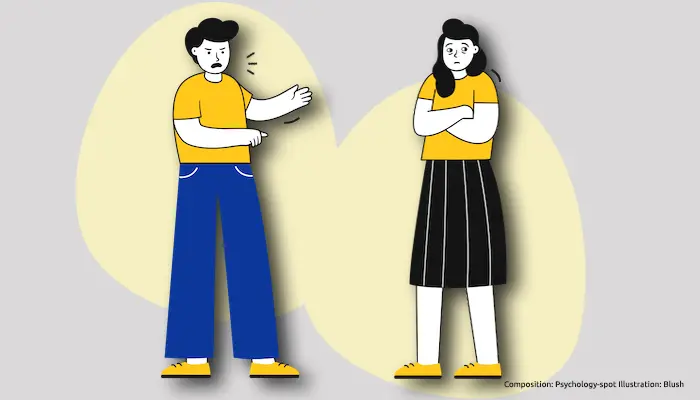
The intransigence of the Royal Army Medical Corps accounting systems during World War I prevented war neurosis from being recognized as a pathology, despite the fact that by the end of 1914 it already affected 10% of British officers.
According to a study carried out at the University of Sussex, the intransigent attitude of politicians, economists and doctors of the time prevented to treat adequately this problem, reinforce the units of attention to soldiers and, ultimately, generated an enormous social stigma since the psychological disorder was associated with cowardice.
There is no doubt that intransigence can manifest itself at any level and sphere of life. It is true that sometimes being uncompromising is not only necessary but even valuable. But it is no less true that most of the time intransigence causes more problems than it solves.
What is intransigence?
Intransigence is a concept that implies not giving in. The uncompromising person is convinced that his or her point of view is fair, reasonable, or true. And that is why he or she does not yield a millimeter. From this perspective, it has been associated with positive characteristics such as tenacity, persistence, and perseverance.
However, the meaning of intransigence is also the opposite of compromise, which comes from the Latin transigĕre and indicates partially yielding with the aim of reaching an agreement, seeking a common ground and ending differences. This perspective reveals the darker side of intransigence and moves it away from sanity. In fact, intransigence often borders on stubbornness with overtones of selfishness, underpinned by the inability to act flexibly when circumstances change.
However, a more impartial concept of intransigence, stripped of cultural meanings, refers to it as a resistance to the impulse to change malleably from previously established solid positions.
How to stop being intransigent?
As already explained, intransigence is not always bad. We should not think that it is necessarily a pejorative or undesirable personality characteristic. Standing your ground is sometimes good. Other times it is bad. It all depends on the circumstances.
The problem with the intransigent person, however, is that they do not have the mental flexibility to adapt to changes. As a result, she can be obstinate in defending positions that end up hurting her or assume attitudes that harm others or affect her relationships. This means that in order to stop being intransigent, it is necessary to develop a certain flexibility, both cognitively and emotionally.
Let go of the need to be right at all costs. Intransigent people are often more interested in being right than in hearing the perspectives of others or having a dialogue. Instead, if you want to develop a broader view of the world, you should listen to what others think and ask questions, instead of making forceful statements that close the doors to the necessary dissent.
Focus on understanding rather than imposing. Intransigence often stems from the belief that we have the absolute truth. It does not foresee the existence of different possibilities and points of view. Therefore, if you want to stop being intransigent, you must try harder to understand others. In fact, understanding does not necessarily mean agreeing, but only accepting that there are other ways of seeing the world.
Let others do the talking instead of monopolizing the conversation. Intransigent people are often too full of themselves and their ideas, so they tend to monopolize the conversation to assert their points of view. However, they don’t learn anything that way as they only reinforce their perspective. Instead, letting others speak, listening to them and reflecting on their words can help you open your mind.
Open the door to contradiction. Intransigence is often the expression of the fear of uncertainty, since it allows one to cling to certain ideas that generate a feeling of security and stability. In a certain way, when intransigent people find an idea with which they identify and feel comfortable, they close their minds around it to prevent other ideas from “contaminating” it and upsetting that balance. For that reason, differing opinions are often perceived as threats. However, until you accept that the world is contradictory, you will not be able to develop a more open mind in which ambivalent ideas can coexist.
Be more humble. Intransigent people are not usually characterized precisely by their humility. Not only do they want to be right – with capital letters – but they also want to impose their truth on others. Therefore, to stop being intransigent it is essential to develop a more humble attitude. Acknowledge your mistakes and limitations. Accept that you don’t know everything and that anyone in this world can teach you something, even the one you least expect.
What does it mean to be uncompromising?
We can all be more or less intransigent in certain situations. Not compromising in the defense of our assertive rights is positive, for example. We can also demand that we be treated with respect and dignity. Or maintain a firm and unshakable stance against violence. However, we must be careful not to become intransigent.
In these cases, intransigence is linked to a desire not to commit to the other. It is a cover behind our position using our beliefs and ideas as weapons without the slightest intention of building bridges. As a result, uncompromising people often develop a psychological pattern: they become reluctant to adapt their worldview to reality.
In fact, in many cases “The uncompromising attitude is more indicative of inner uncertainty than of deep conviction,” as philosopher Eric Hoffer explained. “The implacable stand is directed more against the doubt within than the assailant out.”
Sometimes intransigence does not arise from solid beliefs, as we like to think, but is rather the response of an ego that feels attacked and wants to defend itself. After all, sometimes you have to have more security and confidence in yourself to open up to dialogue than to cut off communication. Therefore, intransigence can be the expression of a fear of discovering that our beliefs, values and ideas are not as solid as we thought.
In fact, we are more resistant to compromise and uncompromising on some issues than others. A study conducted at the University of Nebraska-Lincoln found that in highly uncertain environments that are perceived as a threat, the more conservative people tend to be more intransigent and less willing to change and compromise.
From this perspective, intransigence can be an extreme response to uncertainty because holding on to our ideas, beliefs, and stereotypes gives us a sense of security. This attitude becomes a kind of lifeline and shield to protect an ego that feels threatened in a world that is changing.
This is confirmed by psychologists at Stony Brook University. In their study they found that the people who participated in a purely economic negotiation were relatively generous with an average offer of 62%. Furthermore, the majority of the participants (84%) accepted at least one split in favor of their opponent; that is, allowing them to keep 60 or 80% of the money.
However, the negotiation changed radically when the game was taken to the political ground and values came into play. For almost all political negotiations, the average offer was well below 60% and was rejected by most of the participants.
The psychologists concluded that “People with stronger moral convictions and more extreme attitudes on a particular issue were more aggressive when negotiating, which contributes to failed negotiations.” They believe that “Moral conviction activates a mentality that makes it difficult to offer concessions, even making people despise or dislike more their opponent”.
Lights and shadows of intransigence
Intransigence taken to the extreme, like almost everything in life, is harmful. Psychologists from the Autonomous University of Madrid found that when people manage to distance themselves sufficiently from a situation, they tend to act in a more intransigent way, governed by a consequentialist reasoning. That is, they become convinced that the means justify the ends and make more extreme decisions that often cause harm to others.
The main problem with intransigence is that it often dynamites bridges of understanding. When no one is willing to take the small steps necessary to bring postures closer beyond the comfort zone they were in, the gap is likely to widen. The main consequence of this intransigent attitude is direct confrontation. A battle – literal or metaphorical – in which there is a winner and a loser.
However, intransigence cannot be demonized either. There are times when we must not compromise. But we must also be aware that the situations in which we must be firm are not as many as our ego leads us to believe.
In everyday life, it is usually much more intelligent and assertive to flex positions and reach agreements. It is generally better to focus on what unites us than on what divides us. As politician Barney Frank put it, “The key to understanding the agreements is to remember that the ankle bone is connected to the shoulder bone. Anything can be the basis of a deal.”
How to deal with an uncompromising person?
1. Level your expectations. Sylvia Plath stated: “If you don’t expect anything from anyone, you will never be disappointed.” Although it is very difficult not to have expectations about the behavior of the others and about how things should go, the truth is that if we wait for uncompromising people to put themselves in our shoes and understand us, we will probably end up terribly disappointed and frustrated. If we know we have intransigence to deal with, we’d better level our expectations and not ask the elm for pears.
2. Manage your emotions and feelings. Uncompromising people can get on our nerves. It is normal. When we try to be empathetic or have a problem and hit a wall, it is understandable that frustration ensues. However, tension creates more tension. Ideally, you should breathe deeply. Relax. Assume a psychological distance. And only then, decide what to do.
3. Don’t take it personally. When we let our emotions take over, it’s easy to take it all personally. We can think that that person has something against us when it is more likely that this intransigence is a personality characteristic that has been formed over the years. Instead, it will be much more helpful to us to think that life is not fair and that along our way we will have to deal with many unpleasant situations. They are not a punishment from the universe. It is not personal. It is just one more experience.
4. Get straight to the point. When we are faced with an intransigent person, our first reaction is usually to try to convince him or her. We resort to all the reasons given and to have. But that verbiage does not usually overcome intransigence. The best thing is that you stop for a minute to think about your strongest arguments and what you could have in common with the person in front of you. Focus on it. When we provide many reasons, our interlocutor may perceive them as justifications created expressly to convince. Therefore, it is better to maintain clear and concise communication.
5. Point out the uncompromising behavior. Sometimes making the other person notice that she or he is being uncompromising can be key to penetrating their barrier. In order to avoid being defensive, it is important to encourage empathy and avoid recriminations or any hint of aggressiveness. You just have to limit yourself to noting, without trying to blame, how this intransigence is affecting you or explain its future consequences.
Sources:
Delton, A. W. et. Al. (2020) Moral Obstinacy in Political Negotiations. Political Psychology; 41(1): 3-20.
Miley, F. & Read, A. (2020) Soldiers don’t go mad: Shell shock and accounting intransigence in the British Army 1914-18. The British Accounting Review; 100956.
Haas, I. J. (2016) The Impact of Uncertainty, Threat, and Political Identity on Support for Political Compromise. Basic and Applied Social Psychology; 38(3): 137-152.
Aguilar, P. et. Al. (2013) Psychological distance increases uncompromising consequentialism. Journal of Experimental Social Psychology; 49(3): 449-452.



